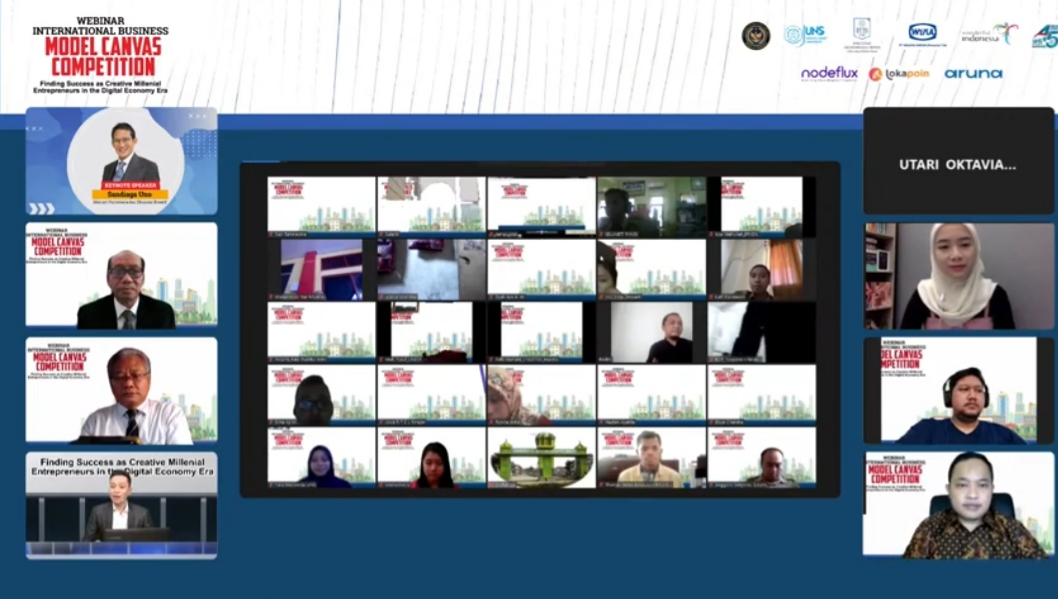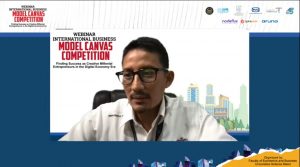
Menparekraf Encourages Millennials to be Entrepreneurs
Currently, around 34 million Indonesians are dependent on the tourism sector and the creative economy. The government of Indonesia, through the Ministry of Tourism and Creative Economy, invites millennials to start a business, become entrepreneurs, and take opportunities to create jobs.
 Indonesia needs new entrepreneurs to stimulate SME’s recovery and development because tourism sectors and the creative economy are the spearheads of job creation. Currently, 97% of jobs are created by Micro, Small, and Medium Enterprises (MSMEs) and Start-ups businesses. This statement was mentioned by the Minister of Tourism and Creative Economy (Menparekraf), Sandiago Salahuddin Uno, as the Keynote Speaker in the International Business Model Canvas Competition Webinar, organized by the Faculty of Economics and Business, Universitas Sebelas Maret (UNS), Monday, April 26, 2021.
Indonesia needs new entrepreneurs to stimulate SME’s recovery and development because tourism sectors and the creative economy are the spearheads of job creation. Currently, 97% of jobs are created by Micro, Small, and Medium Enterprises (MSMEs) and Start-ups businesses. This statement was mentioned by the Minister of Tourism and Creative Economy (Menparekraf), Sandiago Salahuddin Uno, as the Keynote Speaker in the International Business Model Canvas Competition Webinar, organized by the Faculty of Economics and Business, Universitas Sebelas Maret (UNS), Monday, April 26, 2021.
During the pandemic, almost all creative economy sub-sectors are seeing a decline in their contribution to the Gross Domestic Product (GDP). There are only 2 (two) sub-sectors with a positive and steady GDP growth, namely mobile/computer application and game developers, as well as television and radio broadcasting. Including eSports, the economic values of these industries are more than IDR 16 trillion in total. These two sub-sectors relied on technology and digitalization in their application and targeted the technology-savvy consumers.
“Normally, fashion, culinary, and crafts are the creative economy sub-sectors that contribute the most to the GDP. However, currently, those sectors experienced a significant decline, reaching up to 2.8% in fashion, 3.3% for crafts, and 3.89% for the culinary sector,” Sandiaga said.
This situation happened because those subsectors have not optimally adapted to digitalization. E-commerce and other digital platforms, which support and facilitate MSME to improve their business, have not been optimally adopted by fashion, culinary, and craft businesses. Even though some MSMEs have initiated digital adoption, the implementation is still limited and needs further improvement.
According to Sandiaga, in 2021 creative economy faced a challenge in the transformation of conventional MSMEs into digital-based businesses. Such condition is motivated by a change in global consumer behavior that prioritizes health, hygiene, and limited mobility.
Development is crucial for digital businesses or any other businesses based on technology, big data, cloud computing, artificial intelligence, and the internet of things. This development will encourage creative economy actors to be more efficient and time-efficient in policies making based on real-time and accurate information because data science is getting more advanced each coming day.
In front of more than 1,000 participants in the webinar ‘Finding Success as Creative Millennial Entrepreneurs in The Digital Economy Era,’ Sandiaga said that Indonesia currently has approximately 170.9 million young population (millennials and Generation Z) and is predicted to reach 187.6 million population in 2030. This demographic bonus is an opportunity but also a challenge, and if the current education does not equip the young generation with entrepreneurship, education, and leadership, they will become a burden in the future.
These challenges must be solved through human resources development. The human resources in the creative economy sector must be established with an entrepreneurial, innovative, proactive, and risks taker millennial mindset. We must encourage innovation, adaptation, and collaboration with various stakeholders.
“I hope that this International Business Model Canvas Competition can introduce new businesses and ideas from millennials, thus contributing to the Indonesian economic growth, supported by digital start-ups in various sectors,” Sandiaga concluded.
The seminar, which was opened by the Vice-Rector for Academic and Student Affairs, Prof. Dr. Ir. Ahmad Yunus, MS and the Dean of FEB UNS, Prof. Drs. Djoko Suhardjanto, M.Com. Ph.D., Ak., invited four speakers, namely Utari Octavianty, the Co-Founder and General Director of Aruna, Keke Genio, the Co-Founder and CMO of Lokapoin Content Creator at Youtube, Meidy Fitranto, the Co-Founder and CEO of Nodeflux, and Agung Nur Probohudono, SE, M.Si. Ph.D., AK, CA, CFrA, as the Head of Accounting Study Program FEB UNS. (Humas FEB).
